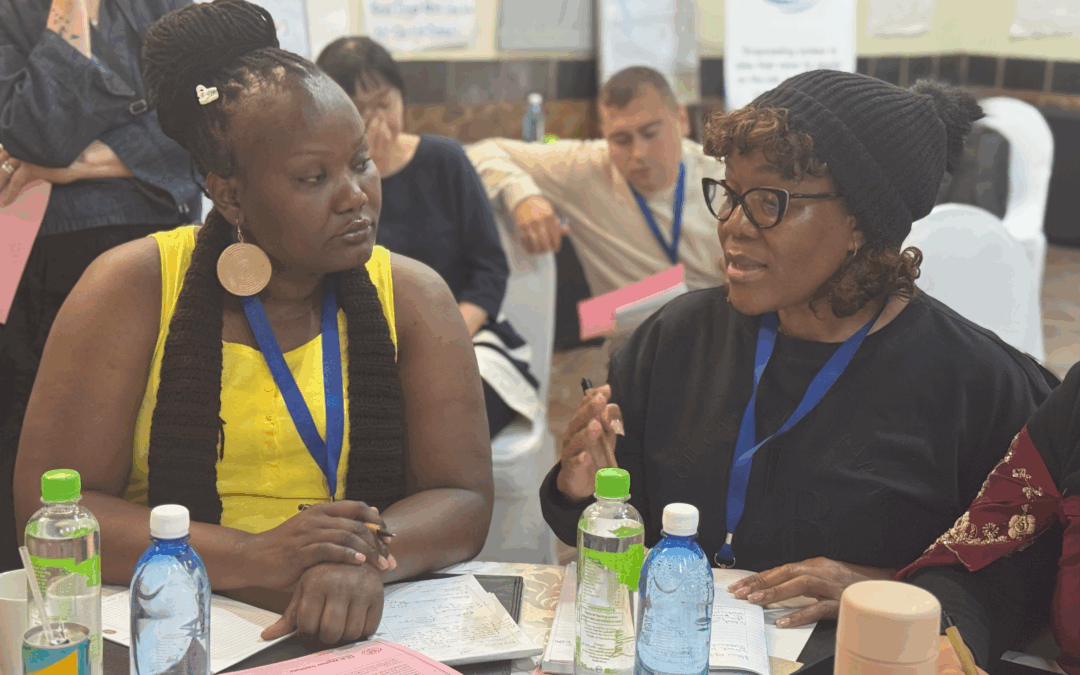
Aug 27, 2025
Nineteen union leaders and labor rights defenders working to advance democracy in communities around the world convened in South Africa in June as part of the Global Labor Leadership Initiative (GLLI), a multi-year Solidarity Center partnership with Cornell ILR. The GLLI connects union leaders worldwide to share strategies and build stronger movements. By defending rights, winning safer workplaces and lifting new voices into leadership, they show how democracy grows when workers have the power to shape change.
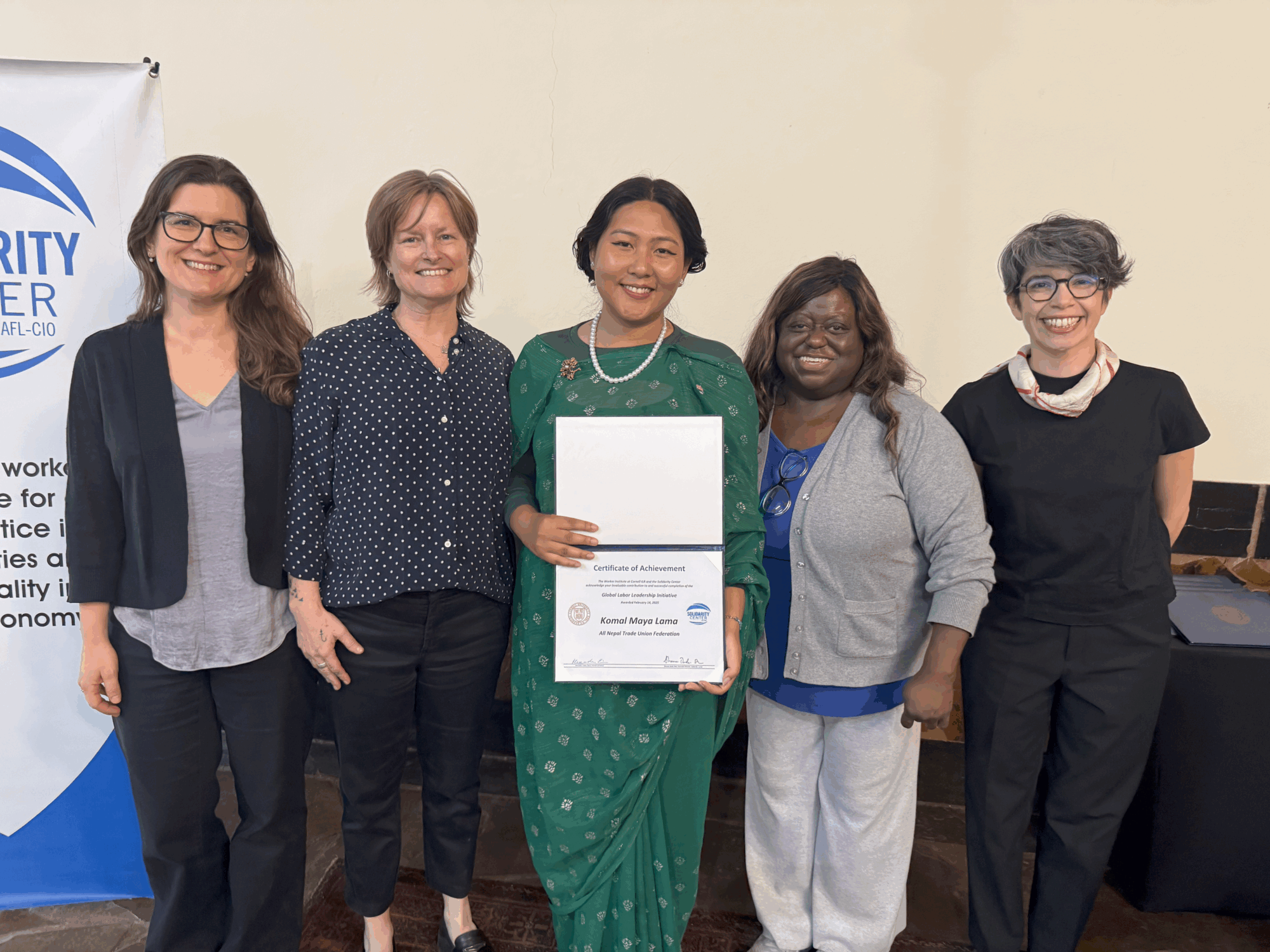
“It feels like I am not alone in this journey,” said All Nepal Health Volunteer Workers’ Union (ANHVWU) President and GLLI participant Komal Maya Lama, who accepted a completion certificate from Solidarity Center and Cornell ILR Worker Institute GLLI facilitators. Photo: Connie Mabin
“It’s amazing to know about the people all over the globe,” said young worker Komal Maya Lama, All Nepal Health Volunteer Workers’ Union (ANHVWU) president and 2025 GLLI participant. “It feels like I am not alone in this journey. I have built a beautiful bond and learned so many things from those leaders.”
Annually, the GLLI provides participants with solidarity and skills-building opportunities so they can help build a dynamic, powerful and inclusive labor movement to transform society and the economy so that it works for workers.
This year, GLLI participants from Kenya, Lesotho, Liberia, the Maldives, Nepal, Nigeria, the Philippines, Serbia, Sierra Leone, South Africa and Taiwan met near Johannesburg from June 22-27 where they shared strategies to tackle in-country and mutual challenges affecting working people, often in the face of brutal conditions, and worked to strengthen global movement building.
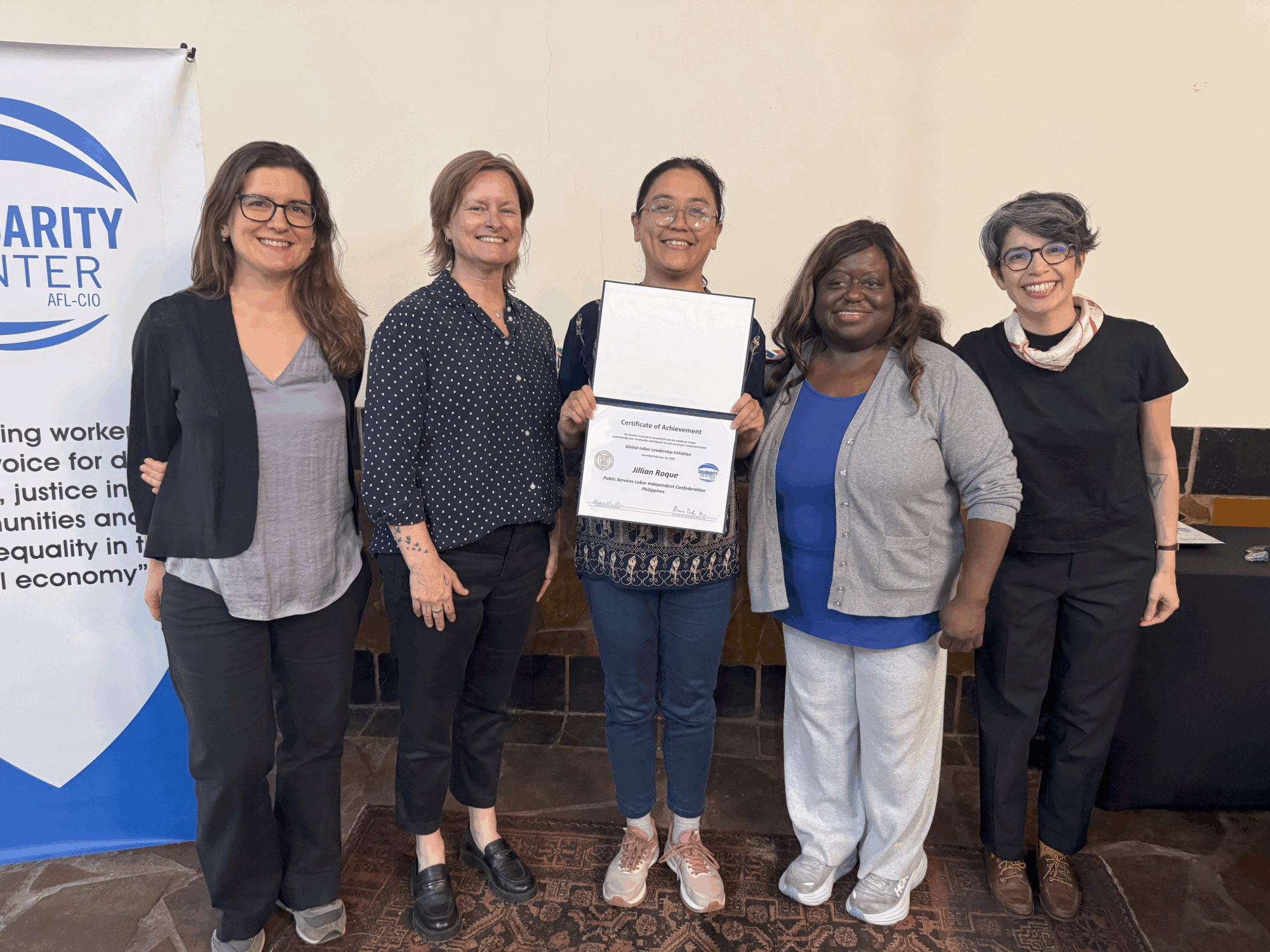
“I’ve gained tools I can use to make my leadership more effective,” said Philippines Public Service Labor Independent Confederation (PSLINK) Deputy General Secretary and Chief of Staff Jillian Roque, who accepted a completion certificate from Solidarity Center and Cornell ILR Worker Institute GLLI workshop facilitators. Photo: Connie Mabin
“I’ve gained a lot of very practical things: tools I can use to make my leadership more effective, more strategic, more intentional–the very things we need to really make changes on the ground,” said Jillian Roque, deputy general secretary and chief of staff of the Philippines Public Service Labor Independent Confederation (PSLINK).
Democracy depends on working people and their organizations to keep it resilient, said 2025 GLLI participants, who discussed unions’ unique role and capacity to push back on unjust and undemocratic forces. Building on a 2024 retreat in Sri Lanka that focused on individual leadership assessment and development, the South Africa retreat broadened the lens to thinking about how unions can bolster their organizations and strategies across social movements. They shared approaches for defending and promoting worker rights in the face of an ever-growing assault across the globe on working people.
“Trade unions have the best position to get people really together,” said a GLLI participant who is an independent labor activist.
“Connecting with people doesn’t mean that you put people on social media and attract their attention; it is really about how you can interact with them. Trade unions are so crucial to the democratic movement for discussing issues and hearing people’s voices: To get people really together,” he said.
Worker rights are in free fall across every continent, leading the ITUC to warn this year against a “billionaire coup against democracy that now threatens democracy itself.” According to the 2025 International Trade Union Confederation (ITUC) Global Rights Index, workers’ access to justice was restricted in 72 percent of countries during the reporting period, representing the worst level ever recorded.
As the largest democratic movement in the world, unions are uniquely placed to defend and expand democracy, not only through elections but in the workplace, in communities, and national and global institutions. Where independent unions provide individuals with the opportunity to elect and be leaders, and join in common cause for better wages, benefits and working hours, and where organized labor holds politicians accountable, democracy thrives.
“Unions are a school for teaching people how to organize and fight for their dignity and rights and how people get others to join them. That’s why we’ve seen unions on the forefront in defending democracy in Belarus, in Zimbabwe and eSwatini, in Hong Kong and in Tunisia,” said Solidarity Center Executive Director Shawna Bader-Blau at last year’s GLLI convening, in Washington, D.C..
Unions benefiting from their leaderships’ participation in the 2025 GLLI in South Africa included:
- Kenya’s Amalgamated Union of Kenya Metal Workers (AUKMW)
- Kenya Medical Practitioners Pharmacists and Dentists Union (KMPDU)
- Lesotho Public Employees Union (LEPEU)
- Liberia’s United Workers Union of Liberia (UWUL)
- Maldives Health Professional Union (MTUC)
- Nepal’s All Nepal Health Volunteer Workers’ Union (ANHVWU)
- Nepal’s General Federation of Nepalese Trade Unions (GEFONT)
- Nepal Trade Union Congress (NTUC)
- Nigeria’s Federation of Informal Sector Workers of Nigeria (FIWON)
- Philippines’ Associated Labor Union (ALU)
- Philippines’ Public Service Labor Independent Confederation (PSLINK)
- Serbia’s trade union confederation Nezavisnost
- Sierra Leone Domestic Workers Union (SLeDoWU)
- South Africa’s National Education, Health and Allied Workers’ Union (NEHAWU)
- South Africa’s Federation of Unions of South Africa (FEDUSA)
- Taiwan Domestic Caretakers Union (DCU)
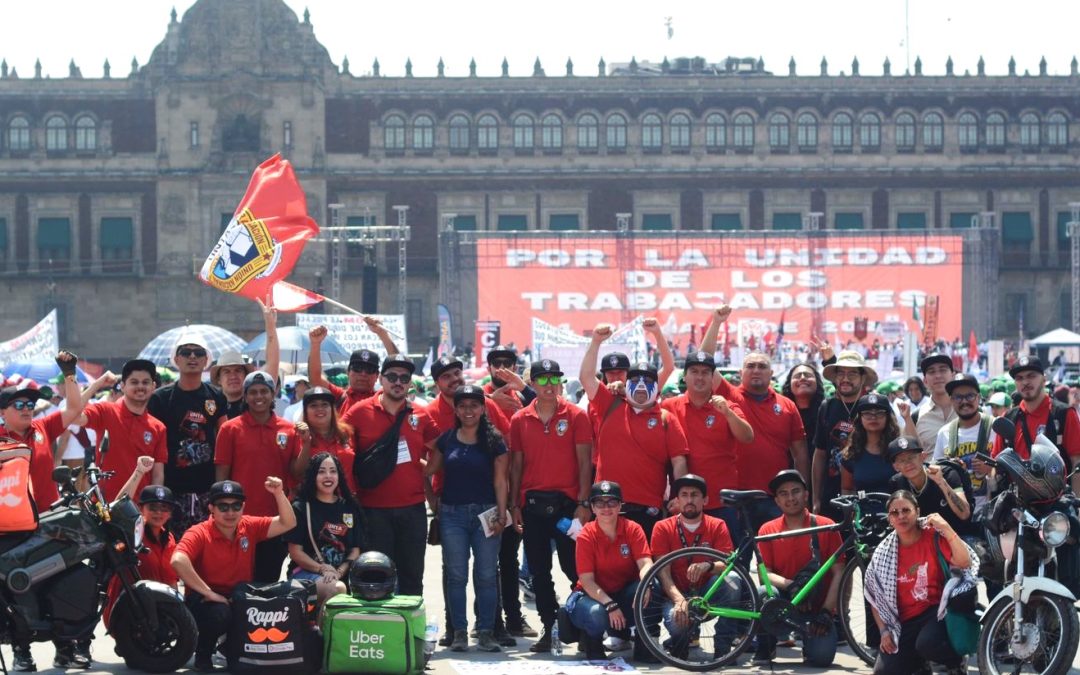
Jan 6, 2025
App-based delivery drivers and drivers paid the minimum wage in Mexico celebrated the holidays with new legislative reform that recognizes them as workers and ensures their access to social security, accident insurance, pensions, maternity leave, company profits and a Christmas (holiday) bonus.
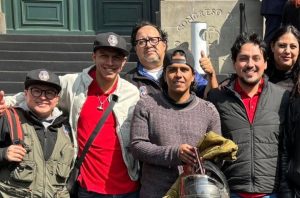
App-based delivery drivers and drivers paid the minimum wage in Mexico are now recognized as workers and have access to social security, accident insurance, pensions, maternity leave and company profits. Credit: UNTA
The law, introduced by Mexico’s President Claudia Sheinbaum on October 15, passed with full approval by the lower house and the Senate, which voted in December. It recognizes gig workers as employees, entitled to worker benefits and protections under Mexican law.
Some 658,000 workers are employed across Mexico on digital platforms, with 41 percent earning above the minimum wage. The National Union of App Workers (Unión Nacional de Trabajadores por Aplicación, UNTA) campaigned for the new law, taking a key role in urging its passage. Because of its advocacy, up to 2.5 million workers, according to Mexico’s government, will now have access to important social protections and benefits.
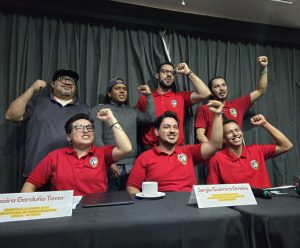
Mexico app-based drivers took part in a media conference as part of the campaign to pass a landmark law covering platform workers. Credit: Rubén Piña
In a media conference with its partner, the Solidarity Center, UNTA members expressed support for the regulation and also highlighted areas for improvement, such as recognizing connection time as part of total work hours. UNTA is an affiliate of the International Transport Workers’ Federation (ITF) and part of its Latin American Platform Workers’ Network.
“This reform reaffirms what we have been saying for years: We are workers,” says the General Secretary of UNTA, Sergio Guerrero. “And after years of hard struggle, this historic achievement contributes to the dignity of digital workers in Mexico, Latin America and the world.”
Ensuring Decent Work for App-Based Jobs
With few formal economy jobs available, workers worldwide are turning to the platform-based economy to support themselves and their families. While the rapid increase in app-based jobs offers millions of workers additional avenues to earn money, it also creates new opportunities for employer exploitation through low wages, lack of health care and an absence of job safety.
According to the International Labor Organization (ILO), digital platforms have created new opportunities and blurred the labor relationship between employers and workers. As a result, the digital platform work model does not adhere to standards of decent work, or fundamental ILO treaties (“conventions”), especially those on freedom of association, collective bargaining and discrimination in employment and occupation. Digital platform workers often earn low wages and lack access to social protections, minimum wage protections, employment benefits such as paid vacation and opportunities for collective bargaining.
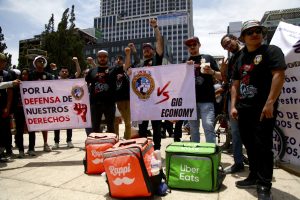
App-based drivers in Mexico waged multiple rallies in support of decent work. Credit: Iván Stephens
As in Mexico, app-based workers who drive motorbikes, bicycles and cars to deliver food and transport passengers receive no paid sick leave or vacation. They work long hours and rush between deliveries, risking their safety because if they do not, the app—via the company—punishes them by lowering pay. When drivers or deliverers are injured, they receive no compensation from their employers.
In Mexico, the law now addresses such issues, ensuring that workers have the flexibility to define their own working hours and requiring the employer—such as Didi, Rappi and Uber—to register workers in the nation’s social security program, covering occupational risks and providing access to health and housing benefits. Companies are required to register contracts with the government, which must detail working hours, income and algorithmic management rules.
Further addressing what workers describe as the company’s frequent abuse through algorithms, the law prohibits companies from charging for the use of the platform and obliges them to issue detailed payment receipts and respect digital disconnection outside working hours. It prohibits companies from manipulating workers’ income to avoid their classification as dependent on employers of digital platforms and blocks the collection of fees from workers for registration, use, separation or similar concepts related to the employment relationship.
In Mexico, digital companies now must guarantee the publication of algorithmic management policies and may not manipulate income to distort the employment relationship or carry out contractual simulations. The law also prohibits withholding of workers’ wages. The new law in Mexico is one of the most progressive in the world in regulating work through digital platforms, guaranteeing fundamental labor rights.
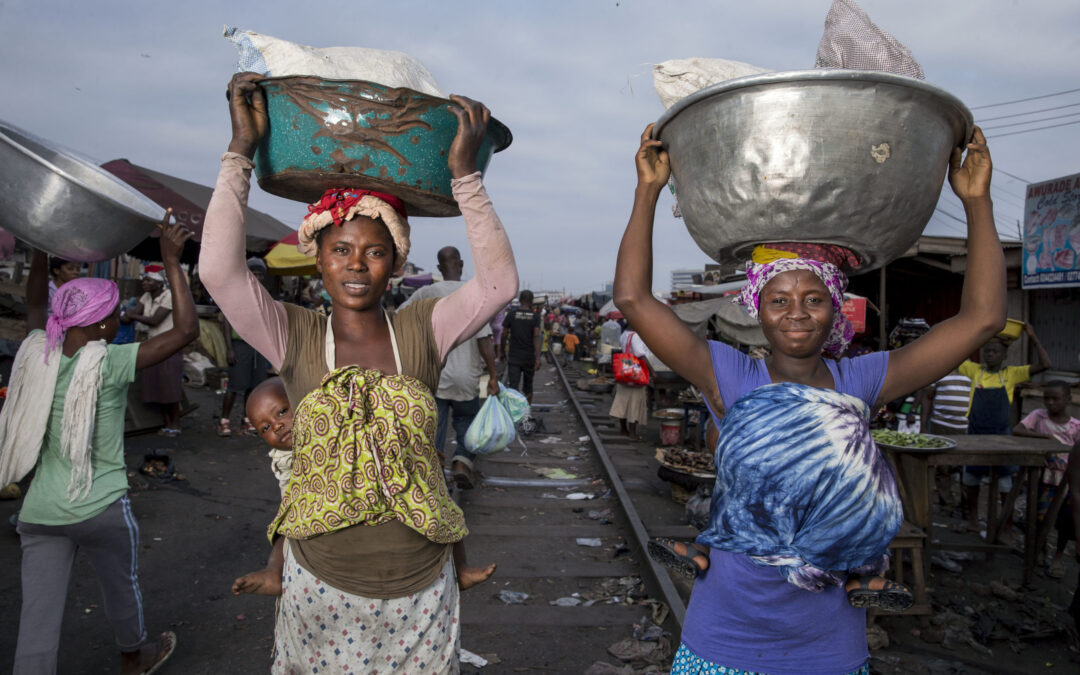
Dec 9, 2024
A four-year, regional, health care rights campaign led by the Organization of Trade Unions of West Africa (OTUWA) is expanding its success and influence in the region with Sierra Leone’s Finance Minister last month announcing a 2 percent increase in the country’s budget allocation for the health sector, from 7 percent in 2024 to 9 percent in 2025.
“The Sierra Leone Labor Congress appreciates the increase as a success of our health care campaign,” says OTUWA Executive Secretary John Odah, while noting that Sierra Leone’s government has not met the 15 percent minimum annual budgetary health allocation to which African heads of state agreed in the landmark 2001 Abuja Declaration.
Like many countries in the region, in the context of mounting national debt, multinational tax dodging and illicit financial flows, Sierra Leone’s government is struggling to provide essential services to its citizens, including accessible health care.
Sierra Leone’s health care funding increase builds on the success of OTUWA’s “Health Care Is a Human Right” campaign this year in Nigeria, where the federal government in April announced a disbursement of almost $70 million to bolster the country’s health infrastructure.
Given that more than 80 percent of West Africa’s working people earn their living in poorly paid and uncertain informal-sector jobs, lack of access to state-provided health care or health insurance is placing an unfair financial burden on low‐income individuals and households, say unions. A United Nations report noted that 381 million people, or almost 5 percent of the world’s population, were pushed into extreme poverty in 2019 by out-of-pocket health expenditures.
OTUWA’s health care rights campaign unites West Africa’s unions in a fight for equal and fair health care access for all. Campaign participants, which include OTUWA affiliates and national health care unions, have been advocating since 2020 for the protection of health worker rights and effective, accessible health care for all with national and continent-wide African Union legislators and policymakers, including the Economic Community of West African States (ECOWAS) Parliament. An OTUWA survey of 700 health workers living in Gambia, Ghana, Nigeria, Senegal, Sierra Leone and Togo provided a window into the region’s health-sector shortcomings and presented a raft of recommendations that included increased funding for the health care sector across the region. This year, the campaign expanded its influence through an alliance with Public Services International, a global union federation that represents 30 million workers in 154 countries and, to preserve public resources, added good governance to its demands.
“We celebrate with our Sierra Leonean brothers and sisters and will continue to support unions that are demanding more investment by governments in the health of their citizens,” says Solidarity Center Africa Regional Program Director Christopher Johnson.
OTUWA represents trade union national centers in the 15 West African countries comprising ECOWAS. None of West Africa’s signatory governments–required by ECOWAS Fundamental Principles to promote and protect human rights in accordance with the African Union (AU) Charter on Human and People’s Rights, including provision of social protections such as health care–are implementing the 15 percent minimum annual budgetary health allocation.
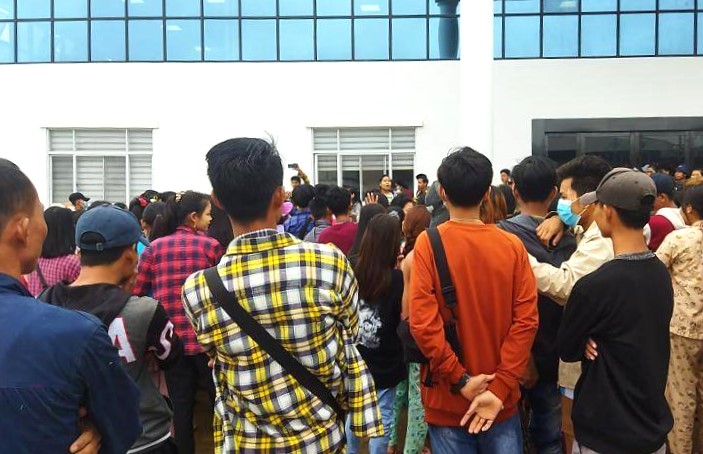
Nov 27, 2024
Some 500 factory workers are on strike in Yangon, Myanmar, demanding a return to the job for colleagues who joined them in seeking decent wages and working hours and a workplace free from violence and abuse. Since the strike began in November, more than 50 workers have been fired. On November 22, the company brought in a group of 20 agents from the repressive military junta to threaten workers with physical violence to break the strike.
The members of the Federation of General Workers of Myanmar (FGWM) at the Charis Sculpture factory went on strike in November after the employer did not comply with the terms of a new contract negotiated in July.
The Hong Kong-owned Wise Unicorn Industrial Ltd., owner of Charis Sculpture, has an estimated annual revenue between $10 million and $50 million. Yet in October, when workers protested the employer’s refusal to pay overtime as promised, workers described being followed out of the factory, with two physically attacked.
After the workers went on strike inside the factory November 6 and boosted their list of demands to include dismissal of the director who they say assaulted two workers, the company fired 13 workers, including strike leaders.
“He dragged me and then pushed me with force. I fell down,” one worker told the union. (Names are not used to protect workers’ privacy.)
According to workers, the company says the workers were dismissed for violating the employment contract and “will be dealt with by existing law,” which workers say is an unlawful dismissal.
By November 11, workers were denied entry to the factory and nearly 350 workers remain outside on strike.
Standing Strong Despite Danger
Since the February 2021 military coup, thousands of people have been killed and many more imprisoned, with union leaders especially targeted. Workers—women in particular—took an early lead in the protests against the regime, with the country’s 450,000 garment workers especially active in organizing civil disobedience actions and shutting down factories.
Protests against low wages and poor working conditions remain risky. Yet workers at Charis, a manufacturer of cold-cast bronze, fine porcelain and alloy statues for export to Europe and the United States, are standing strong for their demands. They seek to receive family-supporting pay, including a daily wage of 9,000 Myanmar kyats ($4.28), up from 7,800 kyats ($3.71).
With overtime pay essential for basic support, they call for a 2,000 Myanmar kyats (.98 cents) per hour overtime wage, from the current 1,700 (.81 cents). The workers say many need overtime but the employer does not select them—and overtime pay is “important for workers because the basic wage is not enough,” said one worker.
Women workers especially face physical and verbal harassment, according to the union, which is seeking safe workplace conditions, an end to verbal and physical abuse and an environment with suitable temperature. They also are seeking employer-paid medical care and an end to wage cuts when workers take leave.
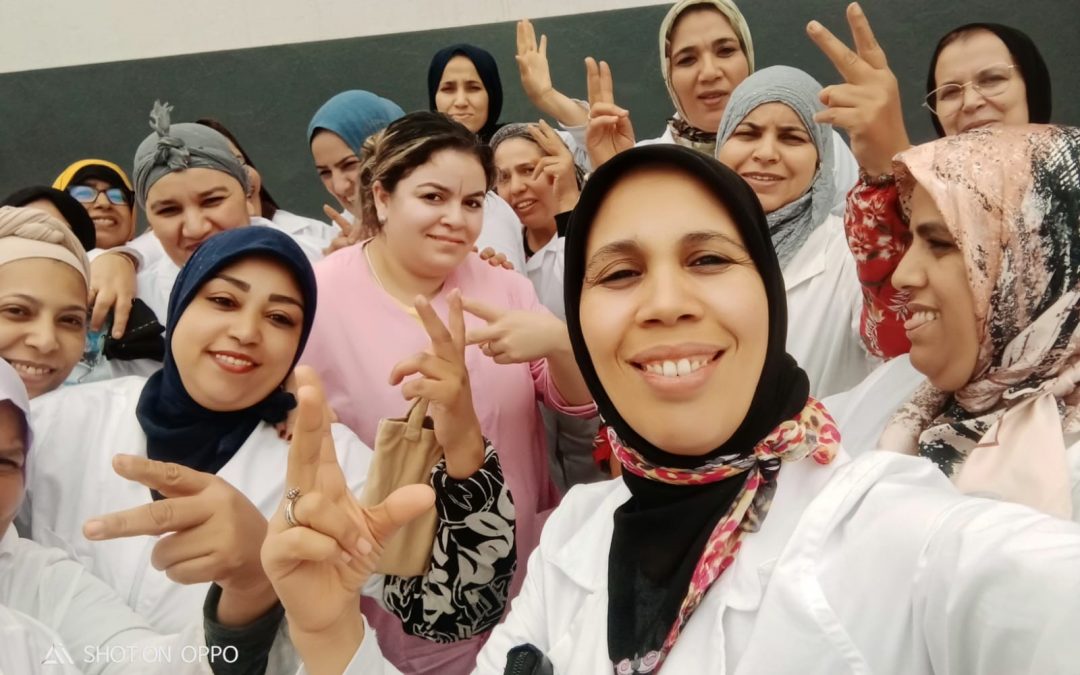
Nov 15, 2024
Nearly 2,000 workers at textile factories in Casablanca, Morocco, now can receive decent pay, health care protection and a voice on the job after joining the Moroccan Workers’ Union (UMT) and the federation of textile workers.
“We joined the union primarily to preserve our dignity, which some managers have trampled on,” said one worker, who voted for the union. (Names are not used to protect workers’ privacy.)
All 605 workers in three factories in Casablanca and the majority of the more than 1,000 workers in four additional factories in the area’s large textile industry joined the union.
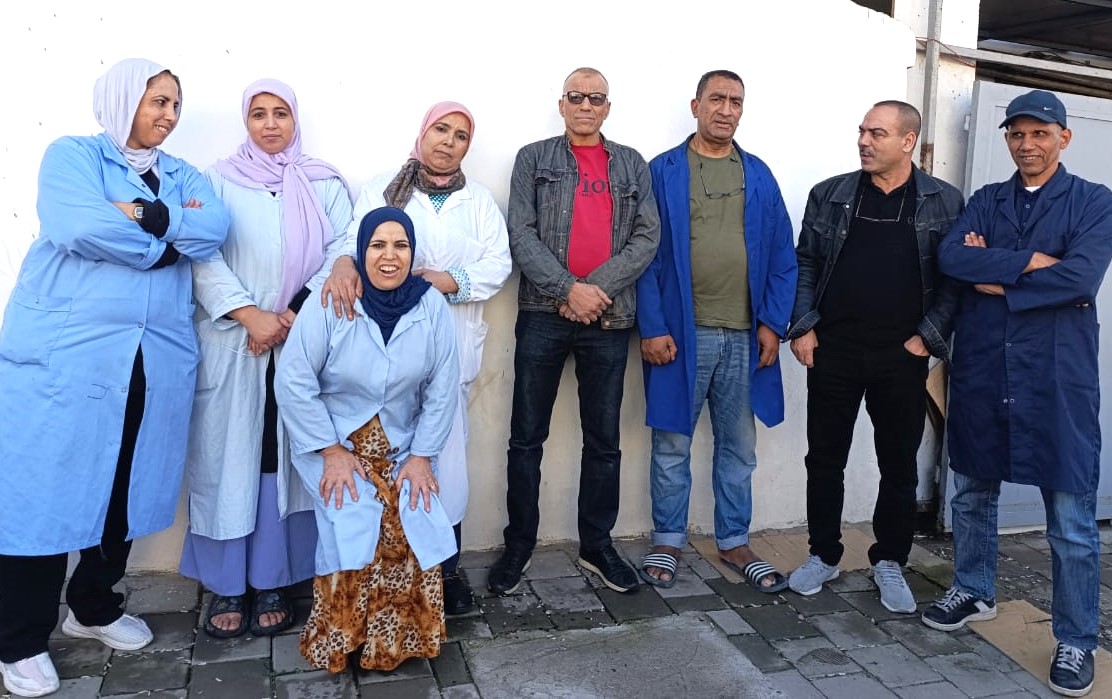
With a union, workers at textile factories are able to address workplace safety and GBVH. Credit: Hicham Ahmaddouh
Without a union, said one worker, “we couldn’t find solutions to our issues or secure our legal rights, which the company has neglected for more than five years.”
Workers at the leather, textiles, and ready-made garment factories are involved in leather production, sewing, dyeing, supplies and garment manufacturing. They say they often were not paid wages, and received insufficient compensation when often required to work overtime—or engage in fewer hours than specified by the government.
“Wage payments are often delayed, and we only receive them after striking and protesting,” one worker stated when describing conditions before the union representation.
Another worker described being “required to work up to 240 hours a month instead of the legal 191, which should qualify as overtime, yet we receive no compensation.”
Developing Outreach
Achieving success in mobilizing and assisting textile workers to form unions was part of a two-year campaign involving Solidarity Center support in providing data and analysis of key employers, supply chains and other information.
Together with the UMT, the Solidarity Center trained a team led by two women and one man to head up the organizing drive. Over the past year, the team conducted one-on-one outreach at the factories, located in a difficult to access industrial zone. They met with company officials, organized offsite outreach meetings and collected worker stories about their needs and challenges in accessing their fundamental rights.
The outreach effort is essential for expanding the union’s efforts to broaden worker rights.
“Organizing textile workers is crucial to strengthening the union’s capacity to advocate for workers’ rights, secure demands and build solidarity within the Moroccan Labor Union and the National Union of Textile, Leather, and Ready-Made Garment Workers,” said Al-Arabi Hamouk, general secretary of the National Federation of Textile, Leather and Ready-Made Garment Workers.
Textile workers sought improved occupational health and safety in the factories and wanted to ensure the companies’ adherence to labor laws and payment to the country’s social protection fund
“Since 2023, we have been deprived of health coverage because the company hasn’t paid the required contributions, even though they are deducted from our wages,” one worker said.
By forming a union, abuses such as violence and harassment could be addressed, according to a factory worker.
She said in the past, workers suffered “from verbal and sexual harassment by some managers, as well as arbitrary individual and collective dismissals when demand decreases or when we ask for our legal rights.”
“The Solidarity Center played a critical role in the success of the campaign within the textile sector,” said Hamouk. “The organizing team demonstrated the ability to strategize, and address challenges.”
Assisting textile workers in forming unions moves forward their ability to achieve decent wages, safe workplaces and essential health care coverage—and advances their democratic rights to freely form unions.
Said one union member: “We achieved dignity and the freedom to associate, which was previously denied.”
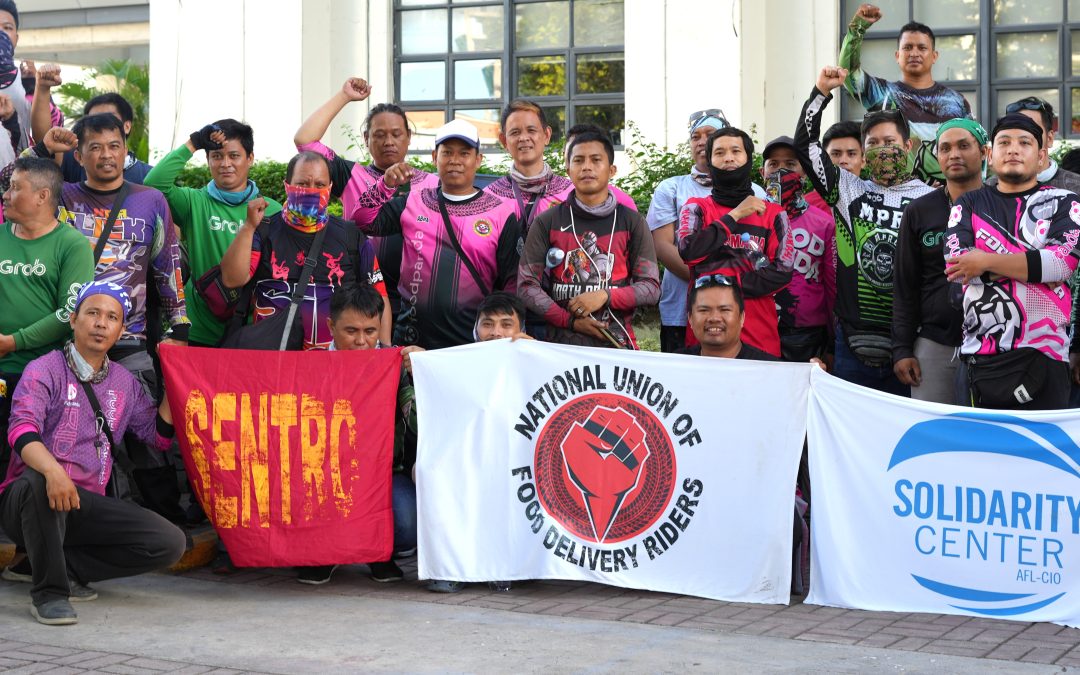
Nov 12, 2024
Drivers in Cebu, Philippines, are staying strong as Foodpanda challenges a ruling by a government agency that determined they are employees of the corporation and must receive around $128,000 in lost wages.
Foodpanda is appealing the decision the National Labor Relations Commission (NLRC) issued in September that required the company to reinstate a 2018–2020 compensation plan that cut driver’s pay by more than half. The ruling also stated that “with no ability to negotiate or alter their fees, riders are more like employees receiving a standard wage rate than independent contractors.”
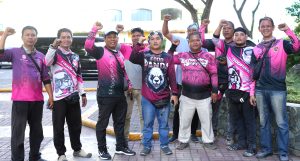
Foodpanda is challenging a court ruling determining drivers in Cebu are employees who must receive decent pay, safety and health protections and health care.
Credit: Solidarity Center / Miguel Antivola
As with other app-based rideshare and passenger delivery corporations around the world, Foodpanda seeks to classify workers as independent contractors to avoid labor laws requiring pay, safety and health protections, and health care.
“For the five years I’ve worked for Foodpanda, they haven’t offered any type of leave or financial support for medicine,” said Abraham Monticalbo, Jr. The RIDERS-SENTRO (National Union of Food Delivery Riders) member described his experiences working for a company that is not required to adhere to labor protections: “We only get paid when we get an order. If you don’t get bookings, you don’t get paid.”
Foodpanda’s appeal “is just a small amount for the company, yet they’re being stingy with the riders. It’s clear that they don’t really care about our well-being,” Monticalbo said at a union press conference.
Seeking Fairness on the Job
The NLRC ruling on Foodpanda and Delivery Hero Logistics Philippines, Inc., would mean “we can finally receive our earnings that should have long benefited our families and ourselves,” Monticalbo said. “Because of our win, we receive justice.”
The Cebu Foodpanda union chapter of RIDERS-SENTRO has sought fair wages and transparency in the Foodpanda app on scheduling, compensation and suspension. In April, more than 200 Filipino app-based delivery riders took part in a unity ride around Cebu province to protest wage theft.
The Foodpanda app–via the company–sets the rules and is unaccountable to drivers, unilaterally updating acceptance rates, special hours and more. “If you are suddenly tagged for suspension and you follow due process in the app as we were instructed, you will get suspended before they take any action,” said Monticalbo. “Even if you do it right, the suspension is still ongoing. We can’t do anything about it since the tag is still in the system.”
Like Foodpanda, many app-based companies often deploy a “bait-and-switch” tactic, offering benefits to riders only to change the terms later.
“Management treated us well before. If I can compare it to what’s happening now, it’s so far off,” said Monticalbo. Drivers still do their job “because they already left their previous jobs. If they don’t deliver, they don’t earn.”
After the ruling supporting drivers, RIDERS-SENTRO invited the company to enter into discussions for a collective bargaining agreement. With a union, said Monticalbo, the riders are confident of their ability to win their rights on the job even with Foodpanda’s appeal
“Because of the union, we have the fighting spirit for this. We realize our power, our rights.”













